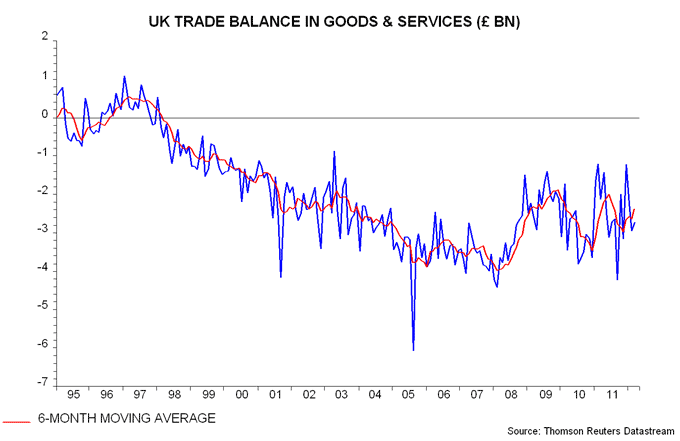Officialdom and the consensus cheered sterling’s 2007-08 collapse on the grounds that it would speed economic recovery. Posts at the time suggested that capacity and credit constraints would prevent a major expansion of tradeables output, implying a bigger boost to inflation and consequent squeeze on real incomes and spending – see, for example, here. The net impact on the economy, therefore, would be negative, at least in the short to medium run.
Three years on, there is little reason to revise this assessment. The trade volume response to the lower exchange rate has been muted – net exports strengthened by 0.9% of GDP between the fourth quarters of 2008 and 2011. Non-oil import prices, meanwhile, surged by 8.8% over the same period, implying a 2.6% direct boost to the domestic price level (based on a 29% share of non-oil imports in domestic demand).
Weak wage trends suggest that workers have been unable to obtain compensation for increased prices. The import cost boost, in other words, may have cut real employment incomes by 2.6%. An equivalent impact on consumer spending would imply a GDP drag of 1.6% (based on a 62% share of consumption in GDP), comfortably exceeding the positive contribution from net exports. (This ignores any effect on corporate spending.)
Trade improvement has stalled since early 2011, partly reflecting Eurozone economic weakness. Goods export volumes rose by only 0.3% in the year to the first quarter of 2012, with a fall of 3.3% in deliveries to other EU countries offsetting 4.4% growth to the rest of the world.
Supply-side weaknesses may constrain trade performance even if foreign demand strengthens. The percentage of CBI manufacturers operating below capacity is close to the historical average, while skilled labour shortages have surged. The percentage citing credit or finance as a constraint on exports remains elevated.
The UK’s experience casts doubt on the view expressed in a Financial Times comment piece today that “Greek growth would probably surge” in response to a mega-devaluation following EMU exit. Rather than an unlikely export boom, the case for leaving rests on Greece gaining the ability to calibrate monetary conditions to the needs of the domestic economy. Monetary autonomy, however, might be severely restricted amid the financial chaos likely to accompany departure.